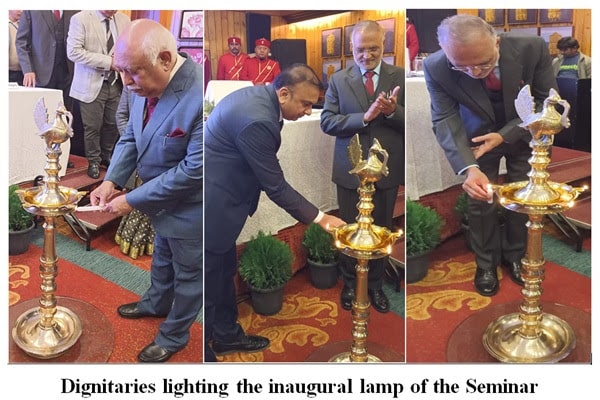

TDSAT organized a Seminar on “Regulatory Mechanism and Dispute Resolution in Telecom, Broadcasting & Cyber Sectors” in Gangtok, today (17th February 2024). Justice Shri Biswanath Somadder, Chief Justice, High Court of Sikkim was the Chief Guest and Shri Basava Prabhu S. Patil, Advocate General, Government of Sikkim was the Guest of Honour.
Justice Shri D.N. Patel, Chairperson, TDSAT delivered the welcome address. He informed the august gathering that TDSAT has been organizing such seminars in different parts of the nation to spread awareness and discuss relevant issues in telecom, broadcasting and IT sectors. Justice Patel explained the jurisdiction of TDSAT extending from telecom, broadcasting, cable services, airport tariffs, aadhaar matters, cyber matters to Digital Personal Data Protection. Chairperson also informed the august gathering of the efficient delivery system of TDSAT including the success of its Mediation Centre in expeditious resolution of disputes. He also informed that though TDSAT has its seat at New Delhi but it has held Circuit Benches at various places like, Pune, Chennai, Kolkata, Indore and Amritsar in the past 15 months or so to help the local litigants to provide justice at their doorsteps. The next Circuit Bench would be held at Cuttack, Odisha later this year.
Justice Shri Biswanath Somadder, Chief Guest of the Seminar delivered the inaugural address. He applauded the effort of TDSAT in organising this Seminar in the State of Sikkim for the awareness of people of the State. Justice Somadder highlighted that the Telecom is an important sector for the consumers and they should be made aware of their rights.
Shri Basava Prabhu S. Patil, Guest of Honour of the Seminar in his address highlighted the fact that participation in such seminars where relevant topics concerning the sectors of jurisdiction of the TDSAT are discussed, are extremely useful not only to the members of the Bar but also to the local people. He stressed that the presentations/talks of the subject experts are very useful for all concerned.
Justice Smt. Meenakshi Madan Rai and Shri Justice Bhaskar Raj Pradhan both Judges of High Court of Sikkim also graced the occasion with their presence.
The inaugural session of the Seminar concluded after vote of thanks delivered by Shri Manjul Bajpai, Advocate and President, Telecom Lawyers Association.
The Business Session of the Seminar was moderated by Shri Manjul Bajpai, President, Telecom Lawyers Association. Shri Yogendra Sharma, Secretary, Information Technology, Government of Sikkim delivered the presentation on “Cyber Fraud and how to safeguard against it”. Shri Kazi Sangay Thupden, Shri Tejveer Singh Bhatia, Ms. Payal Kakra, Shri Kunal Tandon, Shri Vibhav Srivastava and Shri Himanshu Dhawan, Advocates delivered presentations on “”Linear and Non-linear Transmission in the context of OTTs and the jurisdiction of TDSAT”, “Telecommunications Act 2023: Key Aspects”, “Promoting fairness and Efficiency in the Broadcasting Sector, recognizing TDSAT’s contribution to a developing legal landscape”, “The Broadcasting Bill – key features and paradigm shift in the Broadcasting Sector”, “Adjudication Mechanism under IT Act”, “Cyber Crimes and Available Remedies” in that order. Distinguished panel also interacted with the audience and answered their questions. The Business Session concluded after vote of thanks delivered by Shri Nasir Husain, Advocate. The Seminar was attended by Judges, Lawyers, Government Officers, stake holders in Telecom, Broadcasting and IT sectors and also a large number of Law students.
Justice Shri D.N. Patel, Chairperson TDSAT in his closing remarks specifically addressed to the Law students and their faculty, gave useful tips to the young students to seek the new opportunities and try to learn the law to be successful in the profession. He stressed the need that faculty and management should give their students the opportunities to participate in such seminars and also visit various Courts, Tribunals, Adjudicating Authorities to understand and learn the law.